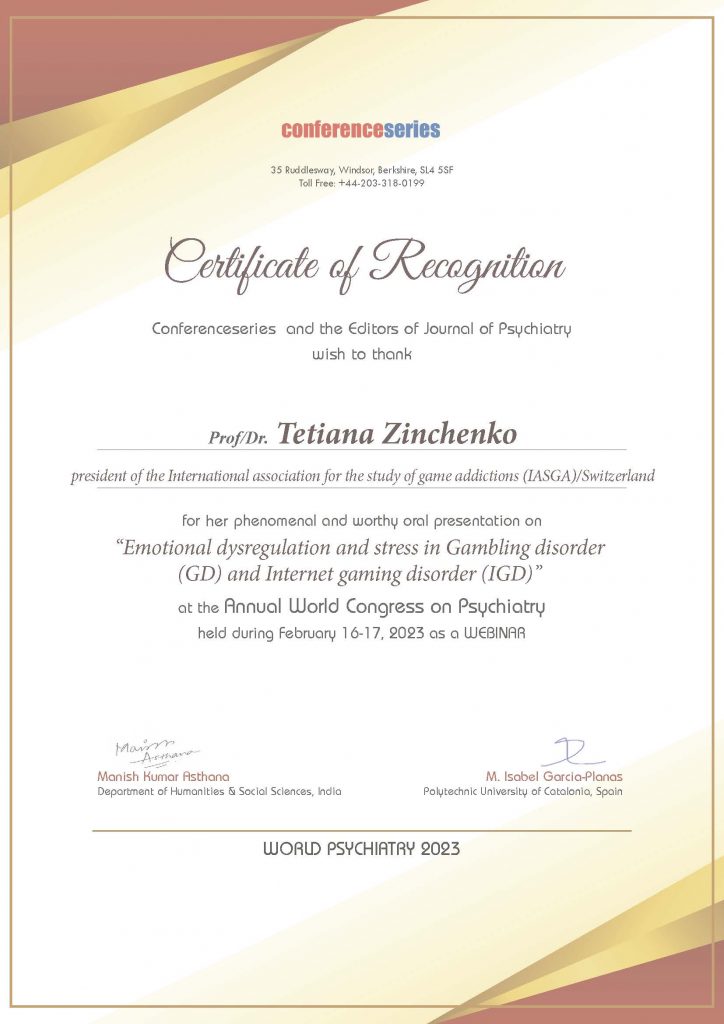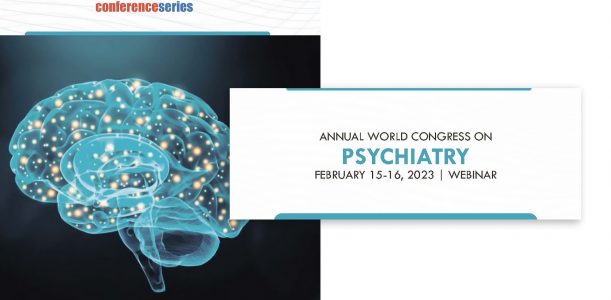IASGA participants attended the Annual World Congress on Psychiatry, which was held on February 16-17, 2023
The Сongress provided a forum for professional discussion, exchange of ideas, and further cooperation. It is no secret that in the field of mental health, we are facing a serious crisis, namely an increase in mental disorders and addictions, especially among children and young people, despite all the efforts made for treatment and prevention. The crisis in the field of mental health is a particular manifestation of the global systemic crisis facing humanity in all areas of society.
Climate change and the information effects of aggressive, negative and manipulative content in games, the internet, social networks, and media are the main reasons for this situation according to many scientists. Any research in this area, combining scientific and clinical experience is very important to find a way out of this extremely grave situation.
Dr.Tetiana Zinchenko, the president of the International Association for the Study of Game Addictions, gave a presentation on the topic:
Emotional dysregulation and stress in Gambling disorder (GD) and Internet gaming disorder (IGD)
She introduced her colleagues to a review of clinical and neurobiological research supporting that online video games, gambling, and also problematic use of social media are not safe recreational activities. People do not relax or unwind while playing games or engaging in social media. On the contrary, their brain, mental activity and emotions look as if they are under the influence of stimulants or stress.
Why do players and regular users have a very real subjective feeling of relaxation and improved emotional well-being?
This effect is due to total immersion in the virtual world and, consequently, detachment and switching from thoughts and worries about the problems and challenges of real life. The primary psychotropic effect of this switch, associated with detachment from negative thoughts, disappears quite quickly. A constant game at the level of problematic and pathological is a distress that is caused not only by events in the games, but also by their negative consequences. The arousal phase is followed by an exhaustion phase with asthenic emotions, depression, lack of desire and strength to do anything, and cognitive dysfunction. All this we observe in patients with IGD and GD. Indicators of experienced distress are functional and structural changes in the brain, vegetative shifts, changes in the secretion of hormones of the hypatoadrenal system and neurotransmitters: cortisol, norepinephrine, and epinephrine.
The authors of the research have concluded the following:
“Some morphometric studies have shown that IGD is associated with structural abnormalities in gray matter (GM), such as decreased gray matter volume (GMV) in the frontal, cingulate, insular, parietal cortex, and amygdala. In the same zones, a decrease in the volume of gray matter is found in post-traumatic stress syndrome as a result of severe chronic distress and depression. A decrease in the volume of gray matter in these areas of the brain is observed due to the debilitating effect on the Central nervous system of chronic distress. In patients with GD, there was a decrease in the content of gray matter in similar areas of the brain, according to the results of morphometric studies”.
“The fact that gamblers and Internet gamers experience stress during the game, problems and pathological players experience emotional distress can be confirmed by the results of studies of the sympathoadrenal system and the hypothalamic-pituitary-adrenal axis (HPA-axis). As a result, all the above-mentioned neurobiological and clinical changes create conditions for the development of comorbid psychopathology or increase the severity of symptoms of already present mental disorders’.
The results of this study explain the serious manifestations of gambling disorders and social network addiction such as: loss of interest, desire, motivation for other activities and communication, lack of initiative, loss of energy, exhaustion, emotional instability, impulsivity, insomnia and difficulty in concentrating.
Professionals from different countries attended the congress and shared their research findings.
Lely Setyawati Kurniawan | Udayana University | Indonesia
Isabel Garcia-Planas | Polytechnic University of Catalonia |Spain
Prerak Kumar | Department of Geriatric Mental Health | India
Dhiraj Bhambhani | People’s College of Medical Sciences and University|India
Johann Lechner | Clinic Integrative Dentistry Munich | Germany
Sumit Kumar | ISF College of Pharmacy | India
Mirela Sarbu | National Institute for R&D in Electrochemistry and Condensed Matter|Romania
Huang Wei Ling | Medical Acupuncture and Pain Management Clinic |Brazil
Fredric Schiffer | McLean Hospital | USA
Bikram Chhetri | Department of Psychiatry| Bhutan
Manish Kumar Asthana|Department of Humanities & Social Sciences|India
Raluca Ica | National Institute for R&D in Electrochemistry and Condensed Matter | Romania
Alina D. Zamfir | National Institute for Research in Electrochemistry | Romania
Delvina Beka | Clinical Psychologist | Albania
Sakshi Gupta | Department of Geriatric Mental Health | India
Priyanka Pandey | Hind Institute of Medical Sciences | India
Jawad Mabood |Khyber Medical University|Pakistan
Silvia Gazzin | AREA Science Park | Italy
We are grateful to colleagues and organisers for the opportunity to discuss this professionally and find solutions together.



